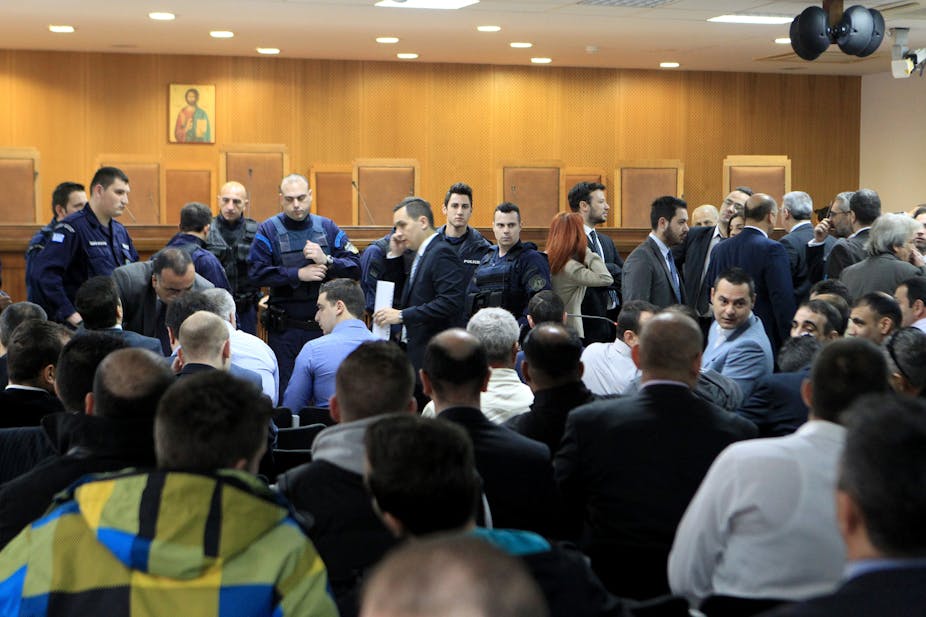The trial of 69 members of Golden Dawn, Greece’s far-right party, has been a stop-start affair, with the emphasis on “stop”. And if the experience of day one of the trial on April 20 – which opened and then was quickly adjourned – is anything to go by, then you would have to be concerned about how long the trial will run, its complexity and the serious risk of social unrest that it might cause.
Inside the courtroom were dozens of lawyers, victims, press and defendants while outside were hundreds of people from anti-fascist groups and local organisations who had marched to the courthouse to witness the trial opening. There were also reports that Golden Dawn supporters attacked witnesses arriving in court.
In the face of all this – and Greece’s much-publicised money troubles – getting the Golden Dawn trial right could not be more vital. The more Europe repeats the threat of “ostracising” Greece for failing to meet the demands of its lenders, the more convincing Golden Dawn’s nationalist and isolationist message will sound.
There is a risk that the trial and its attendant publicity could catapult Golden Dawn into unprecedented levels of public support, especially if the trial fails to demonstrate what the hundreds of pages of legal indictment clearly argue: that it is a criminal organisation posing as a political party.
The rhetoric of the party in relation to the trial is already one of political persecution. Their leader signs his memoranda as a political prisoner, and the party bluntly accuses the former “Conservative” government of having orchestrated these prosecutions.
Justice must be seen to be done
To avoid the pitfall of highly damaging Golden Dawn propaganda, there are pragmatic issues that must first be tackled head on. The constitution, the code of criminal procedure and Supreme Court jurisprudence all mandate that unrestricted access to criminal trials be provided to anyone who might wish to follow the proceedings.
At the very least, the court must therefore reserve a number of seats for the general public. But on the first day of the trial, access to court was severely restricted. If possible, national television should broadcast proceedings, but in any case, every effort must be made to facilitate the work of the media – there should be no scope for Golden Dawn to claim that the proceedings are in breach of the publicity principle.

The court then needs to ensure proceedings run smoothly so they don’t put too great a strain on its limited resources. A 17-day adjournment on the first day of the trial – as a result of one of the defendants appearing in court without legal representation – was not the best start and does not bode well for avoiding possible delaying tactics in the later stages of the process. There will be many more occasions where respecting the defendants’ right to a fair trial will – quite rightly – lengthen the proceedings.
Why 69?
So why opt for such a complex trial with 69 defendants? The answer lies in article 187 of the Greek criminal code, which provides the main basis for the Golden Dawn prosecution. This criminalises the act of setting up or joining an hierarchical criminal organisation of three or more members – which continuously sets out to commit a range of serious offences. This massive trial is the best way to hold Golden Dawn to account as a criminal organisation – rather than just punishing its individual members for the specific criminal acts that they are suspected of having committed.
But this approach brings its own problems – it is expected that in most cases the court’s inquiries as to membership in the criminal organisation will go hand-in-hand with establishing the liability of the defendants for the specific crimes the indictment is based upon. These include murder, attempted murder, criminal damage, assaults and other violent offences. But where this is not possible, there is the risk of deducing from mere membership in the political party – or from sharing its extremist ideology – a membership in the synonymous criminal organisation. So, while the trial sets out to show that Golden Dawn is a criminal organisation – it must not hold that every member is a criminal.

To avoid this risk, the prosecution will have to demonstrate that “each member subjects her or his will to the group” and that “the intention to pursue serious crimes consists of a general manifest preparedness that the crimes be committed”. To explore this further, it is worth reading this analysis by Emmanuel Melissaris.
Crucially, to ensure a fair trial, the criminal liability of each of the 69 defendants must be investigated with sufficient specificity – and his or her role and participation in the activities of the criminal organisation fully established. In a mammoth trial like this, this is easier said than done, but the difficulty of the enterprise should not allow the court to lose sight of its vital importance.

